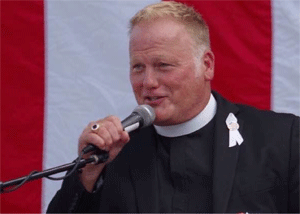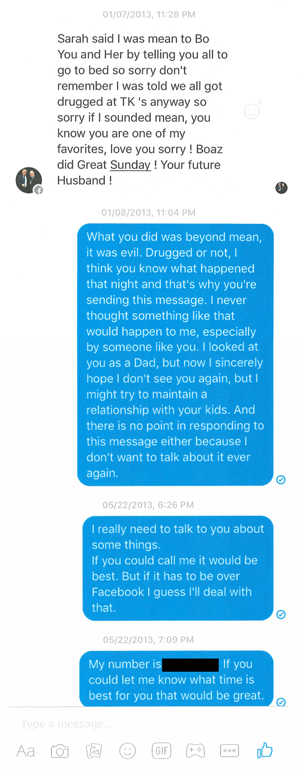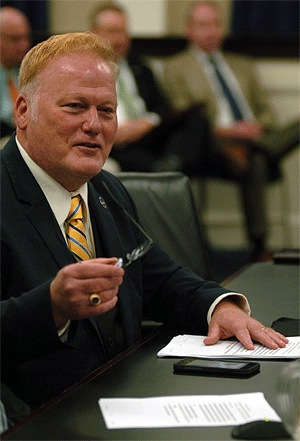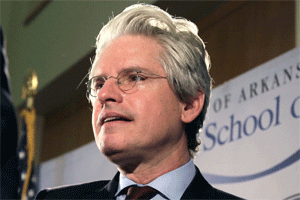The Pope's Long Con: A Kentucky preacher-turned-politician's web of lies
by R.G. Dunlop and Jacob Ryan
Dec. 11, 2017
NOTICE: THIS WORK MAY BE PROTECTED BY COPYRIGHT
YOU ARE REQUIRED TO READ THE COPYRIGHT NOTICE AT THIS LINK BEFORE YOU READ THE FOLLOWING WORK, THAT IS AVAILABLE SOLELY FOR PRIVATE STUDY, SCHOLARSHIP OR RESEARCH PURSUANT TO 17 U.S.C. SECTION 107 AND 108. IN THE EVENT THAT THE LIBRARY DETERMINES THAT UNLAWFUL COPYING OF THIS WORK HAS OCCURRED, THE LIBRARY HAS THE RIGHT TO BLOCK THE I.P. ADDRESS AT WHICH THE UNLAWFUL COPYING APPEARED TO HAVE OCCURRED. THANK YOU FOR RESPECTING THE RIGHTS OF COPYRIGHT OWNERS.

EDITOR’S NOTE: On Dec. 13, two days after the release of this investigation, Rep. Dan Johnson committed suicide in Bullitt County. Read our organization's response to Johnson's death. Our coverage is here.
ONE: Welcome To Pope's House
On a Saturday afternoon at the fellowship hall, the stereo blares Southern rock anthems for a flock of Harley riders in leather vests.
Banners on the wall honor veterans, and flags commemorate the Confederacy. A disco ball hovers over a clawfoot tub full of canned beers — two bucks buys you a token and a token gets you a drink from Charlie the bartender.
In one corner of the room, the "Pope" strides across a stage, his voice full of fervor as he auctions off items to the highest bidder. A motorcyclist died recently in a crash and there is money to be raised for the man’s family.
At the fellowship hall, called "Pope’s House," next to the Heart of Fire Church in southeast Louisville, the motto is “when you are here, you are family.”
And today, Danny Ray Johnson, 57, the self-proclaimed pope, bishop and minister to outcasts, really wants you to bid on this gift card to a local tattoo shop.
“I need somebody right now that’ll give me $50 on a $150 tattoo,” he says. “Who will give me $50?”
The Pope, as everyone knows him, commands this side of the room, his voice tinged with the Louisiana drawl of his youth. His biceps are decorated in ink, his sideburns white, his golden pompadour thinning.
Long ago, Johnson fashioned an identity as a modern-day American patriot. Pro-gun, pro-God, pro-life. He talked in 2013 about making America great again. He lamented the lack of God in everyone’s lives. He wept over the country’s future.
But behind this persona — cultivated, built up and fine-tuned over decades — is a web of lies and deception. A mysterious fire. Attempted arson and false testimony. Alleged molestation in his church.
In Johnson's wake lies a trail of police records and court files, shattered lives and a flagrant disregard for truth.
This seven-month investigation is based on more than 100 interviews and several thousand pages of public documents. It also included numerous attempts to interview Johnson, who refused all requests.
Over and over, there were warning signs for government officials, law enforcement, political leaders and others. Yet, virtually nothing was done. For years, Johnson broke laws. Now, he helps make them.
In his latest feat, Johnson catapulted himself into the Kentucky Capitol in 2016 as representative for the 49th House District.
***
To hear him tell it, Johnson has been on stage nearly his whole life. Like Forrest Gump, he just so happens to be in the front row, playing a pivotal role in America’s biggest moments. Time after time. Decade after decade.
He claims he served as White House chaplain to three presidents. A United Nations ambassador. He says he set up the morgue after the Sept. 11, 2001, attacks and was the pastor who gave last rites for all of those pulled from the towers.
He’s healed the sick and raised the dead. He helped quell the riots in Los Angeles that followed the acquittal of three police officers in connection with the beating of Rodney King. He loves people of all races and religions, and he had a seat at the table for international peace talks.

"Pope's House" fellowship hall. (R.G. Dunlop)
All this despite his history of hate speech, racist Facebook posts and general derision for African-Americans and Muslims. All this, despite his own secrets.
And now, as he paces across the stage at the Pope’s House, Johnson shines, mic in hand, full of passion.
Half of the crowd is focused on Johnson; the other half is interested in beer and the buffet. Johnson’s wife, Rebecca, scans the scene. She spots us.
The church does great work, she says. The Pope is a great man. Why would journalists be skeptical and ask questions?
She points us to the door.
“We know what you’re going to do,” she says. “And you’re going to have blood on your hands. I’m telling you now, it’s the word of the Lord.”
***
On election night 2016, Johnson reveled in his victory, grinning beneath the glow of a neon beer sign at a favorite local haunt near the church.
Inside T.K.’s Pub, dozens of his friends and supporters crowded up to the bar. This was a big night for Republicans. And it was a huge night, the capstone of a wild political season, for the Pope of Bullitt County.
What led Johnson to dive into politics is anyone’s guess. But in recent years, he had begun to assert himself in right-wing and libertarian circles. He talked freedom and liberty with the same fervor he preached about heaven and hell.
In 2014, he cradled an AK-47 — his “favorite anti-mean government gun” — in an interview with Guns.com.
“Jesus taught us to be armed,” said Johnson. “The real reason for our Second Amendment rights is that we have a gun to keep a mean-spirited government off of us. If they go crazy, we gotta have something to be crazier with.”
He was talking about making America great again before presidential candidate Donald Trump made the phrase his own.
“America is great and it needs to be restored to its greatness,” Johnson said during a 2013 Washington, D.C., rally organized by the arch-conservative, anti-Muslim group Freedom Watch.
At the rally, he was introduced as “Bishop” Dan Johnson and gave the invocation wearing a black suit and a white priest’s collar.
Johnson touted the Tea Party, recounted his heroic role in 9/11 and urged elected officials to “get on their knees, not to Allah, but to God Almighty."

Johnson at a 9/11 memorial event in Bullitt County on Sept. 10, 2017. (Jacob Ryan)
Fast forward to July 2016. Jennifer Stepp had won the May Republican primary for Kentucky’s 49th District seat. But a former county jailer filed a lawsuit questioning her candidacy papers, and a judge declared Stepp ineligible.
Then, the Bullitt County GOP’s executive committee met behind closed doors, pored over four candidates and took a secret ballot. The winner: Danny Ray Johnson, the preacher from the nondenominational Heart of Fire Church.
As a newly minted candidate, Johnson’s platform didn’t skew far from his years-old rhetoric supporting guns, liberty and pro-life causes.
“Pray To Make America Great Again” was the edict on his church’s billboard for Freedom Fest, a political rally held in August 2016 at Heart of Fire.
“It’s never been like this before,” Johnson told hundreds of attendees, his voice cracking. Tears welled in his eyes and he held his thumb and forefinger about an inch apart. “We are so close to losing this freedom.
“Donald Trump, we need you.”
***
The only person standing between Johnson and public office was 69-year-old Linda Belcher, a retired schoolteacher, principal and lifelong county resident.
She campaigned on her dedication to public service. Her husband, Larry, had held the 49th District seat for six years before he died in a 2008 car accident. Belcher succeeded him and served three terms. She was the incumbent and a formidable opponent, for sure. But, she was a Democrat in a county that, like many in Kentucky, was becoming increasingly Republican.
Local politics can be combative and personal. Johnson liked to lob verbal bombs at Belcher via Facebook. He skipped the only public debate and canvassing came courtesy of a supporter who drove around a big pickup truck with a Johnson logo.
One Facebook campaign video, shot on a cell phone, opens with Johnson in a military fatigue-style shirt. He stands in front of a flag-draped, military-grade cannon, a piece of artillery the size of a pickup truck.
“Emergency. This is an emergency,” he says, staring into the camera. “We’ve had death threats, we have had bomb threats on our church, bomb threats at our house, our address has been given out, this is happening by lyin’ Linda.”

Danny Ray Johnson (Facebook)
That would be Linda Belcher.
Johnson continues for the camera. He gives out Belcher’s home address. He claims that “the Islam’crat Barack Obama, criminal Clinton and lyin’ Linda have sent Chicago thugs” after him. His children and grandchild have been threatened, he says.
Just recently, Johnson claims in the video, his truck was roadblocked and ambushed, and his friend’s life threatened.
In the cadence of a seasoned preacher, Johnson says Belcher personally “killed” 80,000 babies — a warped reference to her stance on abortion. He says he heard Belcher’s shoes were stained red due to “all the blood of all those babies.”
He calls his critics “pygmies” and “Smurfs.” Toward the end of his five-minute screed, Johnson makes the stakes clear: This is a race that pits Donald Trump and Danny Ray Johnson against “criminal Hillary Clinton and lyin’ Linda Lou.”
His closing plea: “Let’s show ‘em that the good ol’ boys matter.”
***
Founded in 1796, Bullitt County got its name from Alexander Scott Bullitt, a leader in Kentucky’s early political formation. It sits on the far western end of the Bluegrass region and has a population of about 75,000, nearly 97 percent of whom are white.
The percentage of adults with a college degree is less than half the national average. A population boom began in the mid-1970s, after school desegregation and busing came to neighboring Jefferson County, home to Louisville.
Today, it’s not uncommon to see Confederate flags hanging from poles, porches and barns around Bullitt.

Belcher’s campaign couldn’t have been more different from that of her opponent. Her Facebook page featured no Confederate flags, no angry videos and no guns. Her listed interests included gardening, reading, civic activities, crafts and flower arranging.
She heard and saw Johnson’s slanderous boasts but didn’t want to take the bait. She doesn’t know any Chicago thugs, she said. She’s a Christian. “The last thing I would think of would be harming a church.”
Belcher wanted to focus on her own record.
“I’m more of a positive person,” she said. “People who want to believe garbage like that, I don’t know how you convince them otherwise.”
With Johnson’s social media campaign in full gear, some of his Facebook posts made news.
Media reports highlighted racist posts he shared. One image depicted Barack and Michelle Obama as cartoonish apes. Another showed a young chimpanzee with a caption, “Obama’s baby picture.” A third post showed former President Ronald Reagan feeding a small chimp a bottle. It was titled, “Reagan babysits a young Obama.”
Johnson dismissed the criticism. He said Facebook was “entertaining.” He claimed that the posts were simply satire and fair game.
Even his own party disagreed, urging him to withdraw from the race. The state’s GOP chair, Mac Brown, called the posts “outrageous” and the “rankest sort of prejudice.”
Johnson ignored all critics and continued to post and share exclusionary, nationalist, anti-Islam, racist posts. This country was in trouble, Johnson claimed, and needed help. He was the one to provide it.
On election night, Trump swamped Clinton in Bullitt County, winning nearly three-quarters of the vote. In the 49th District race, Johnson beat Belcher by 156 votes.
So, Johnson had reason to smile that night. He was on his way to the statehouse. He had weathered the Facebook controversy, in part because the most controversial posts were removed and his profile made private.
But other aspects of his past cannot be so readily erased.

TWO: From Bastrop To Bullitt: A Strange, Sensational Journey
Kentucky’s self-proclaimed Pope paces in front of the Heart of Fire altar on a Sunday in early July. He’s wearing a red, white and blue shirt, not robes and a collar.
His small congregation knows well that Danny Ray Johnson’s free-spirited sermons can go in many directions.
One minute he quotes from the Bible. The next, he shares tales of his valor or an anecdote about sex with his wife on their honeymoon. Another time, it’s a story about driving trucks through mud holes, or a childhood science fair, or hobnobbing with Kentucky’s political elite, including Republican Gov. Matt Bevin.
This unorthodox preacher is, after all, now a state lawmaker.
To hear the Pope preach it, his life is a series of heroic feats, miracles and inspiring acts. He pops up at major moments in history. Always there. Right in the mix. Just like Forrest Gump.
His fabricated or questionable stories — told in countless sermons and invocations, listed in official biographies and in campaign videos — are too long to list. Here are some of them.
Early in 1991, while working with the Living Waters Church in Pasadena, California, Johnson traveled on a mission trip to South America. There, he claims to have performed a series of miracles. By his own account, he healed the sick and raised the dead.
On the church's website, Johnson promotes a June 1991 letter written by Dr. David Fischer, pastor of the Living Waters Church.
Fischer’s letter asserts that in Venezuela in March 1991, Johnson placed his fingers in the ears of a man who had been deaf since birth. Johnson healed the man instantly, just one of several healings on that mission trip.
Later, Johnson approached a dead woman in front of a crowd of about 7,000 in Colombia. Her skin “looked like rubber with a darkness under it,” the letter claims. “She was slumped over in a chair.”
Johnson lifted her out of the chair, according to Fischer's letter. He spoke to death and commanded it to leave.
“Then Danny spoke life to her and she took a breath ... and another breath. She was raised from the dead!”
Twenty-six years later, Fischer said he doesn’t remember details of his letter. By email, he admitted that he didn’t witness these supposed miracles. Rather, he “depended on later reports from pastors and other people in our large meetings for what may have occurred.”
Who actually witnessed the miraculous healing powers of Kentucky’s pope, bishop and future state representative?
Fischer couldn’t say.

Johnson's nameplate in the state Capitol. (Ryland Barton)
No lie is too big or too small for Johnson. In a campaign video posted the day before the November 2016 election, he implores, “I want to give you a few facts.”
He then says he has four children. In reality, he has five children, including one from his first marriage.
Then he boasts that there was a Ted Nugent rally at Bowman Field Airport and that the conservative rock-and-roller had endorsed him. Spokeswomen for Nugent and the airport said they had no record of such an event.
Other times, Johnson has claimed to have a Ph.D. and to be a “doctor of theology.” And he has said, under oath, that he holds a “doctorate of divinity” from a Bible school in Des Moines, Iowa. A spokeswoman for Kingsway University and Theological Seminary in Des Moines said Johnson studied there but never earned a degree.
Now, for some of his broader exaggerations.
Johnson contends that he was in Los Angeles amid the riots and fires that followed a jury’s acquittal in 1992 of four police officers who had beaten motorist Rodney King. Johnson claims he helped set up “safe zones” in the maelstrom.
The Rev. Dr. Cecil Murray, then of the First African Methodist Episcopal Church, actually was at the heart of the unrest and could see the fires from his church. What Murray didn’t see was a tall, golden-haired preacher from Kentucky. He also doesn’t recall any “safe zones.” We couldn't find any mention of Johnson in the media coverage of the Rodney King riots, and no references to "safe zones."
Around the time of the riots, Johnson also claims he assumed what would be one of the most influential religious positions in the world.
“I served as chaplain to the White House. Chaplain to the White House,” under presidents George H.W. Bush, Bill Clinton and George W. Bush, Johnson asserted in a campaign video.
Not true.
Gary Scott Smith, a retired professor and the author of two books on religious faith and the presidency, scoffed at that claim. There is no such thing as an office of White House chaplain, Smith said. “That would definitely be incorrect.”
Representatives of the three former presidents’ libraries could find no connection between Johnson and the White House.
In campaign videos and speeches, Johnson talks about serving as an ambassador to the United Nations. A UN researcher couldn’t find any evidence of it.
There are UN Messengers of Peace, selected by the UN secretary-general. They include people like cellist Yo-Yo Ma, Princess Haya of Jordan, actor George Clooney, opera singer Luciano Pavarotti and Louisville’s own Muhammad Ali.
Records show no sign of the Pope from Kentucky. No Bishop from Bullitt County. No Danny Ray Johnson.
***
Johnson bowed his head recently at a memorial service remembering 9/11, one of the worst days in this country’s modern history. He says it was one of his worst days too — but regularly boasts about his heroic acts that day.
Time and again, he’s told this story with himself in the lead role.
Looking out a hotel window, he watched the second plane crash into the World Trade Center. He raced to Ground Zero. He pulled a body from the outstretched arms of first responders.
He set up a morgue right there, right near the rubble. And for two weeks — two heinous weeks — the Pope gave last rites for “all of those” pulled from the towers.
But Storm Swain, a Philadelphia theology professor who wrote a book about chaplains at Ground Zero, has never heard of Johnson. She said it’s highly unlikely that any civilian, let alone an out-of-town clergyman, would have been asked to — or would have been able to — set up a morgue in the immediate aftermath of 9/11.
And a spokeswoman for New York City’s medical examiner’s office said she checked with several colleagues who were at the scene. No one remembers Danny Ray Johnson.
Johnson has photos, which he shares all the time, and which appear to show that he was in New York around the time of 9/11. They include shots of him with luminaries such as then-New York City Mayor Rudy Giuliani.
“I live 9/11 every day of my life,” he said at the 2013 Freedom Watch rally in Washington.
In fact, 9/11 is part of his everyday life.
Records show Johnson collects workers' compensation from the state of New York. But there’s no credible evidence of Johnson ever living or working in New York for any length of time. So, his workers' comp benefits are almost certainly tied to 9/11.
His financial disclosure forms, filed in Kentucky in connection with his political campaign and his election, list the public benefit as his only source of gross income in 2015 and 2016.
According to the New York Workers’ Compensation Board, 9/11 workers and volunteers who performed rescue, recovery and cleanup duties are eligible for benefits if they were injured or became ill as a result of their efforts.
Kentucky disclosure forms don’t say how much workers’ comp Johnson is receiving, and New York’s workers’ compensation files are private. So it’s not clear why he’s getting workers’ compensation, or how much he collects.
***
In a sermon in early July 2017, Johnson preaches with one hand in his pocket. On this Sunday, he’s a little more reserved, almost downbeat.
He’d been thinking a lot this morning, he says. He had heard that a pair of investigative reporters were asking questions about him.

Johnson's July 9, 2017 sermon (Facebook)
“Amazing, amazing that folks want to know so much about me. Just being raised on the bayou, raised in church, in a little small church… had a lot of miracles and a lot of things that have happened in my life.”
He asks his congregation how many of them have been part of miracles.
“If you’re like me, if you start trying to tell people how you got to where you are today and you begin to try to tell them all the things you’ve been through, I think you’d be like me, just better to leave a lot of it out.”
The preacher grins and shakes his head.
“I don’t want to even try to explain it, I don’t want to try to tell you, you’d never believe it if I told you.”

Long before he became the pope, the bishop or the politician, Danny Ray Johnson grew up in Bastrop, Louisiana, in the working class city’s upper economic strata. The town is in the impoverished Mississippi Delta region, in Louisiana’s northeastern corner.
Downtown, shuttered businesses surround the courthouse. Jobs have disappeared over the years and now four of every 10 residents live below the poverty line. Barely one in 10 has a college degree. The city’s population is about 11,000.
If you believe his resume, Johnson would be one of the town’s most famous citizens. But when asked about Bastrop’s biggest names, Mayor Arthur Jones mentions a few professional athletes: Bob “Butterbean” Love, Willie David Parker, Calvin Natt. No reference to Danny Ray Johnson.
Over at Bastrop High School, where Johnson graduated in 1979, a yearbook shows him sporting blond, feathered hair and a straight face. Voted neatest in his class, he was part of the school’s rock band and the history and journalism clubs.

Johnson's 1979 high school yearbook photo.
Johnson’s parents, Jerry and Charlene, still live in Bastrop and still own the ranch house where Johnson grew up.
“I don’t know what you want to hear. He’s been a good boy all his life, in church,” said Jerry Johnson, a retired manager at the now shuttered local paper mill who, like his son, sports a shock of gold hair, slicked back in a pompadour.
He and his wife are still close to their son — “as close as a phone call,” Jerry Johnson says — and they are surprised to hear reporters asking questions.
What was the young Pope like? How did he get his start preaching? Was he healed by a miracle?
Johnson has said his religious underpinnings go back to childhood and that, at age 7, he was cured of blindness. It was, by his account, a miracle.
But details of this miracle are spotty. There was an incident with a BB gun and a trip to the doctor, his parents said. It might have been his left eye, maybe his right eye. Maybe it was both.
What is clear is that this incident helped propel Johnson on a path towards God and the pulpit.
Not far from Bastrop, at the Swartz First Assembly of God Church, pastor Gerald Lewis mows the grass, cleans the floors and preaches each weekend. He considered Johnson like a son and thought himself an influence in Johnson’s path to preaching.
Lewis, a pastor of 50 years, saw promise in the young man with the golden hair. But one day, without explanation, Johnson vanished. He never returned to the church and Lewis, his mentor, has no idea why. He knows Johnson dreamed of a life beyond Bastrop.
“Danny always wanted to get out and mingle with the people, like a celebrity, he had dreams of doing something big,” Lewis said.

Johnson's 1985 mugshot.
Danny Johnson spent his 25th birthday, his first in Louisville, at police headquarters.
Just after midnight on Oct. 18, 1985, police stumbled on an abandoned 1982 Cadillac Coupe de Ville in Cox Park, next to the Ohio River. Two people ran away as police pulled up.
The car had been stripped of its tires and rims. It had been doused, inside and out, with gasoline. Someone had intended to set the Cadillac ablaze.
Investigators picked up the pair who ran away. Under questioning, they told police they planned to torch the vehicle. A preacher named Johnson had given them $200 to set the fire and told them they could keep the rims and tires as a bonus. He had moved to the city earlier that year and started working at a church just south of downtown.
The preacher left the car in the church’s parking lot and handed over an extra set of keys. He wanted the deed done that night. He had plans to go out and party with other church ministers. They were celebrating his birthday.
Johnson arrived at police headquarters that morning in a police cruiser, fresh from the party. The detectives pressed him about the car. He said he last saw the Cadillac in the church parking lot. It must have been stolen.
Who stole it? Johnson had no clue. He signed off on a stolen vehicle report.
The detectives were skeptical and asked him to hang around. They had more questions. A short time later, things got serious. Police read Johnson his rights and told him a couple of co-conspirators had confessed.
This time, the preacher told a different story.
He admitted to handing over the keys and paying to get rid of the car. He wanted it destroyed. He wanted to collect insurance money. The young preacher told police he was about to go broke. Johnson owed more than $10,000 on the car, which also needed repairs that would total thousands more.
Money woes had set Johnson back before. He had fathered a child, gotten divorced and filed for bankruptcy in Louisiana just a few years earlier.
Less than two months after his arrest, a grand jury indicted Johnson for complicity to commit arson, a felony, and making a false police report, a misdemeanor. He pleaded not guilty and completed a six-month pretrial diversion program. The criminal charges were dismissed in February 1987.
Years later, while under oath in another case, his story about the gas-soaked Cadillac and insurance scheme would change again. And again, he lied. This time, Johnson claimed the car disappeared.
“When the car came up missing, I didn’t know what happened to the car. It was vandalized.”
***
These days, Sharon Stubbins, 63, spends most of her time in a small Southern Indiana apartment watching television with a home health aide.
Her memory is slightly faded. But she’s never forgotten the dashing young preacher with the Louisiana drawl, the newcomer to Louisville with the passion for preaching.
Yes, she remembers. Thirty-two years ago, she agreed to help torch that Cadillac. He paid her to do it. Johnson needed insurance money. It seemed simple. Until it wasn’t.
Stubbins recalls she had a complicated relationship with Johnson. They weren’t a couple — they didn’t date — but they did sleep together.
She says she hasn’t talked to Johnson since they were arrested in 1985, and she has no desire to. She’s seen his rise to political power, watched it on the television news, in fact. And Stubbins, who is black, has heard about his racist Facebook posts.
“He must be stuck on stupid,” she says.
This was the first time investigators linked Danny Ray Johnson to a mysterious arson plot. But it wouldn’t be the last.

THREE: An Empire Built On Blind Faith
On June 12, 2000, the Heart of Fire Church was ablaze. Flames lit the sky. The building burned to the ground.
Investigators found a rear door of the church unlocked. They discovered a flammable liquid had been poured down a hallway and intentionally set on fire.
Before long, Danny Ray Johnson — the self-proclaimed White House chaplain, United Nations ambassador and healer of the sick — was a suspect. It’s unclear if local and federal investigators knew that Johnson, the church’s founder, had been indicted 15 years earlier in the planned torching of his Cadillac.
As part of the church fire probe, investigators talked to a man who had driven by around the time of the blaze. He told them he saw a white, late-model Cadillac pulling out from behind the church with no lights on, according to police records.
The man said the driver was a white guy who might have had blond hair. And the Cadillac had sped off down Bardstown Road.
The Pope’s hair is blond, golden even. At the time of the fire, he and his wife Rebecca had two cars, records show. One of them was a white 1995 Cadillac.
With his church in ashes, Johnson denied playing any role in the fire. Instead, he blamed the Ku Klux Klan and claimed that numerous threats had been made against the church.

Heart of Fire Church in Fern Creek (R.G. Dunlop)
At the time it burned down, the Heart of Fire Church was essentially bankrupt, according to the insurance company Brotherhood Mutual, which filed a lawsuit after the blaze. The company claimed that the church owed far more on outstanding loans than it could ever pay, more than the property was worth, more than it would sell for.
The company also said that in light of the alleged threats, it seemed odd that no one kept watch at the church at night, that there was no alarm system in the building, no tracking of who had keys to it and no person responsible for making sure that the building was locked.
Arson investigations frequently find that the owner is “in various stages of financial distress,” Brotherhood Mutual attorney Bernard Leachman asserted in the lawsuit.
Court records also detail dozens of bounced checks and credit card debts leading up to the fire. The checks surfaced in bank accounts tied to the church, Johnson and his wife. In a sworn statement given as part of the lawsuit, Johnson acknowledged financial problems. And additional records filed in the lawsuit raise more questions about Johnson’s financial management.
Jennifer Charles, a former church member and employee, told police that Johnson often bragged about beating the system and about having a good attorney.
Michelle Cook, the Johnsons’ secretary and a church member, told police that there was “ongoing misappropriation of funds” at the church. Cook said Johnson would take insurance checks, cut a better deal with contractors and make a little money for himself.
No one was ever charged in the church fire. The insurance lawsuit was settled.
***
A new house of worship rose from the Heart of Fire’s ashes. The new church remained steadfast in its mission: Jesus without judgment. Fellowship for all.
“It was good stuff. He was getting a lot of people who (normally) wouldn’t go to church,” recalls Cliff Richmond, a former church member.
A 2016 Guns.com video shows men and women of the Heart of Fire Church clustered at the altar with a cross looming above them. Seven of them sit in the front row, staring straight at the camera. Another nine stand behind them. They look ready for a school picture. With a nod, they begin to sing.
Amazing grace! How sweet the sound
That saved a wretch like me!
I once was lost, but now am found;
I was blind, but now I see.
Some have handguns over their hearts. One woman is tightly clutching a Bible. Others, assault rifles. There’s a revolver, too. This is the Heart of Fire gun choir.
When we’ve been there ten thousand years,
Bright shining as the sun,
We’ve no less days to sing God’s praise
Than when we’d first begun.
The camera pans to the center, to Johnson, right in the middle of it all. He has on a motorcycle cap, the word “POPE” embroidered on it. His black leather vest carries an American flag patch, a gold cross and a medallion. In his right hand is a Kalashnikov-style assault rifle with a large, curved magazine. The rifle is pointed toward the heavens.
Amazing grace! How sweet the sound
That saved a wretch like me!
I once was lost, but now am found;
I was blind, but now I see.
To the Pope’s right stands a tall man in a backward baseball cap, holding a silver handgun. On the other side of the Pope, a stern-looking man with a salt-and-pepper goatee. His right arm is held up at a 90-degree angle, as if he’s surrendering, or perhaps waving. Two fingers jut out from his clench on his gun. It almost looks like a peace sign.
The video’s description on YouTube notes that if you’re a tattooed, sunburned, gun-toting, leather-wearing biker who might get kicked out of a regular church, you’re definitely welcome at Heart of Fire.
***























